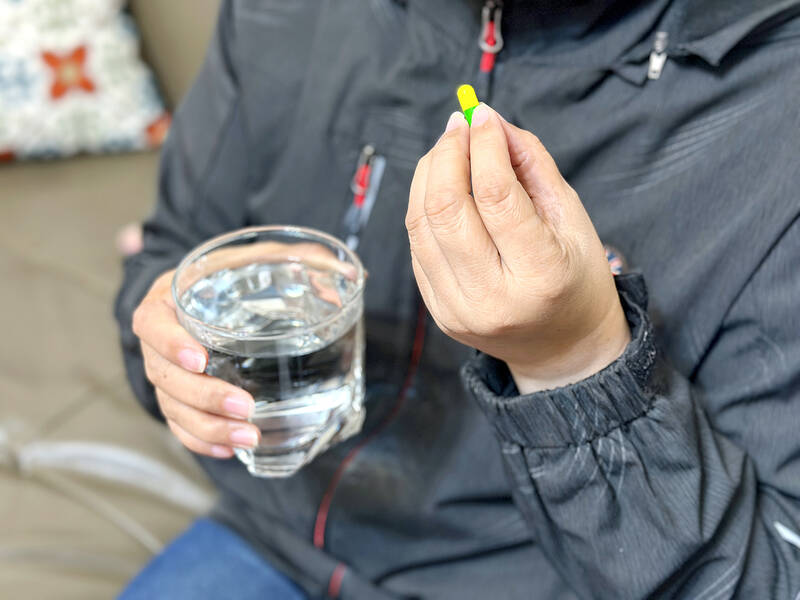The public should closely watch potential fluctuations of medicine prices should Washington proceed with a plan to cut prescription drug costs, despite Taiwan having universal healthcare coverage, former vice president Chen Chien-jen (陳建仁) said yesterday.
US President Donald Trump on Monday signed an executive order ordering US Secretary of Health and Human Services Robert F. Kennedy Jr to reach a deal with pharmaceutical companies about lowering the prices of prescription drugs within 30 days or face new federal regulations.
“I have yet to fully understand Trump’s policy, but I am sure that my colleagues at the Ministry of Health and Welfare, and the medical community would conduct evaluations after seeing how the policy would be implemented,” Chen told reporters. “People in Taiwan should not worry about it too much, because we have protection from universal healthcare, but we definitely need to closely watch the fluctuations of global drug prices.”

Photo: Chen Chien-chih, Taipei Times
Asked if Trump’s policy would prevent new drugs from entering Taiwan, Chen said that the nation has kept up with other countries when it comes to importing new drugs, as the National Health Insurance Administration (NHIA) has a well-established mechanism to bring them in.
Pharmaceutical industry representatives said that NHI medicine pricing reform to be implemented on Jan. 1 next year would enhance supply chain resilience by supporting new locally made medicines.
The NHIA last month announced amendments to the NHI Drug Dispensing Items and Fee Schedule (全民健康保險藥品給付項目及支付標準) and the Regulations of Price Adjustment for NHI Reimbursed Drugs (全民健康保險藥品價格調整作業辦法).
The amendments aim to stabilize domestic supplies of pharmaceuticals and prices amid global volatility by encouraging locally made medications and expediting market access for them.
The amendments stipulate preferential pricing for domestically made drugs within the first two years of launch into a top-10 advanced market, or new chemical entities that have been in a top-10 market for five or more years.
The top 10 advanced markets are: Australia, Belgium, Canada, France, Germany, Japan, Sweden, Switzerland, the UK and the US.
To encourage prompt market access, preferential pricing is provided for locally made generic drugs or biosimilars that were the first or second to obtain drug permit licenses within the five years following patent expiration of the brand name drugs they referenced, the amendments say.
Such drugs would have their price capped by the price of the referenced products, they say.
To stabilize the domestic drug supply, locally made medicines would be eligible for a preferential 10 percent bonus if they have active ingredients manufactured in Taiwan, have safety assessment results published in international journals and listed on their package inserts, or are the first generic drug to apply for “Paragraph IV patent certification” — which declare a referenced drug’s patent to be invalid and unenforceable — and have obtained a drug permit license, the amendments say.
Measures would be taken to accelerate the inclusion of new medicines in the NHI system, facilitate the parallel review approach that enables concurrent applications of drug permit licenses and NHI reimbursements, and ease rules for written applications, the NHIA said.
The Taiwan Pharmaceutical Manufacturers’ Association, the Taiwan Pharmaceutical Manufacture and Development Association and the Taiwan Generic Pharmaceutical Association on April 28 said that imported medicine accounts for more than 70 percent of NHI medicine reimbursements, so pricing reform is needed to bolster locally made medications and ensure stable supply.

The manufacture of the remaining 28 M1A2T Abrams tanks Taiwan purchased from the US has recently been completed, and they are expected to be delivered within the next one to two months, a source said yesterday. The Ministry of National Defense is arranging cargo ships to transport the tanks to Taiwan as soon as possible, said the source, who is familiar with the matter. The estimated arrival time ranges from late this month to early next month, the source said. The 28 Abrams tanks make up the third and final batch of a total of 108 tanks, valued at about NT$40.5 billion

Two Taiwanese prosecutors were questioned by Chinese security personnel at their hotel during a trip to China’s Henan Province this month, the Mainland Affairs Council (MAC) said yesterday. The officers had personal information on the prosecutors, including “when they were assigned to their posts, their work locations and job titles,” MAC Deputy Minister and spokesman Liang Wen-chieh (梁文傑) said. On top of asking about their agencies and positions, the officers also questioned the prosecutors about the Cross-Strait Joint Crime-Fighting and Judicial Mutual Assistance Agreement, a pact that serves as the framework for Taiwan-China cooperation on combating crime and providing judicial assistance, Liang

A group from the Taiwanese Designers in Australia association yesterday represented Taiwan at the Midsumma Pride March in Melbourne. The march, held in the St. Kilda suburb, is the city’s largest LGBTQIA+ parade and the flagship event of the annual Midsumma Festival. It attracted more than 45,000 spectators who supported the 400 groups and 10,000 marchers that participated this year, the association said. Taiwanese Designers said they organized a team to march for Taiwan this year, joining politicians, government agencies, professionals and community organizations in showing support for LGBTQIA+ people and diverse communities. As the first country in Asia to legalize same-sex

MOTIVES QUESTIONED The PLA considers Xi’s policies toward Taiwan to be driven by personal considerations rather than military assessment, the Epoch Times reports Chinese President Xi Jinping’s (習近平) latest purge of the Chinese People’s Liberation Army (PLA) leadership might have been prompted by the military’s opposition to plans of invading Taiwan, the Epoch Times said. The Chinese military opposes waging war against Taiwan by a large consensus, putting it at odds with Xi’s vision, the Falun Gong-affiliated daily said in a report on Thursday, citing anonymous sources with insight into the PLA’s inner workings. The opposition is not the opinion of a few generals, but a widely shared view among the PLA cadre, the Epoch Times cited them as saying. “Chinese forces know full well that